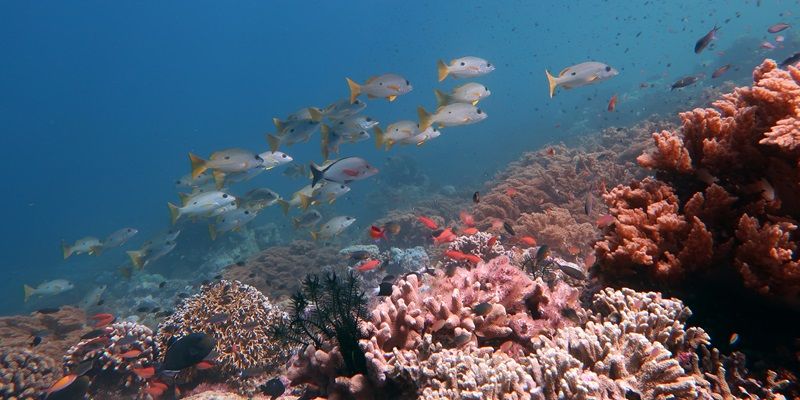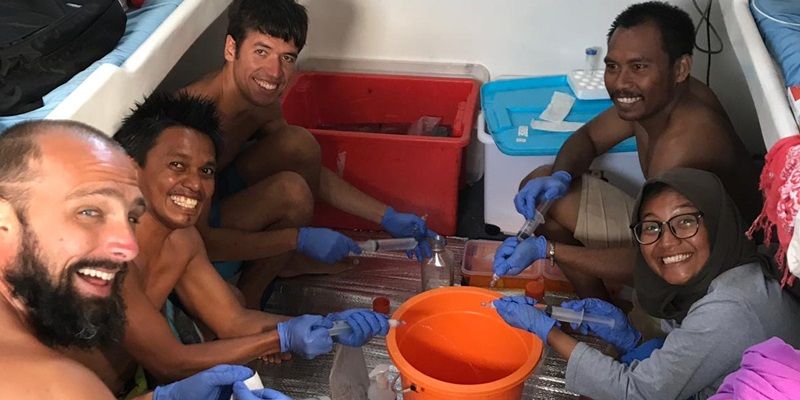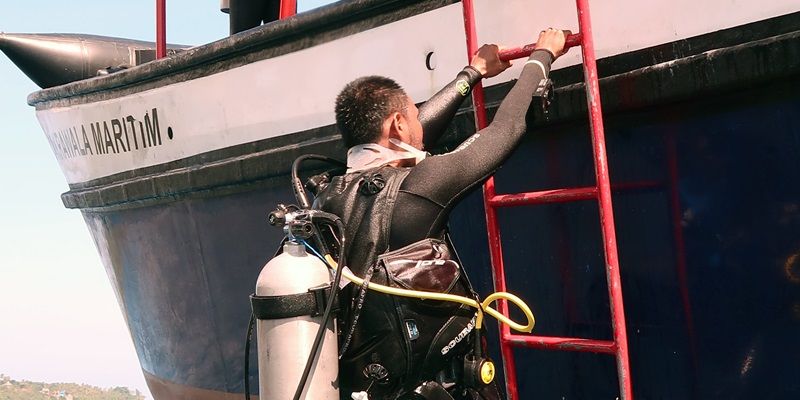Around half of coral cover on coral reefs have been lost since 1950 due to climate change, over fishing and pollution. Since 2009 alone, it’s thought around 14% of corals have died as a result of global warming. This rapid decline is not simply creating an environmental and biodiversity crisis, but also a humanitarian one. Around one billion people, most of whom live in lower income countries, rely on coral reefs for their food and livelihoods.
Yet the situation is not totally bleak. Some corals are proving more resilient than others to the effects of a warmer and more acidic ocean. Ideally, these resilient corals, the creatures that live on them, and the communities which depend on those, should be the priority for protection.
But how can we know which corals around the world are going to cope best with climate change?
One idea is to spot them from space. An international research project, called Climate REEFS, is mapping the properties of adaptive reefs in the Philippines and Indonesia so that reefs with similar characteristics can be identified using satellite imagery.
To reach this goal requires detailed analysis of areas of reef that are currently withstanding the changing climate, as the project’s lead, Professor Maria Beger from the University of Leeds, explains: “Some reefs are very diverse, with many different corals that create lots of microhabitats for other marine organisms to live. These more complex reefs appear more able to adapt to climate change, as they are more likely to have adaptive corals within that diversity. We want to look in detail at what makes these reefs special and work with local communities to understand their relationship with these reefs as well.”

Just as the challenge facing coral reefs is global, so is the team of scientists working to tackle the issue in new ways through the Climate REEFS project. It is mainly funded through the UK’s Foreign, Commonwealth and Development Office (FCDO) as part of the Climate Adaptation and Resilience (CLARE) programme, a collaboration between the FCDO and the International Development Research Centre of Canada (IDRC) .
The project is jointly led by the University of Leeds, the University of Pattimura in Indonesia and the global environmental charity, Rare, which works in both the Philippines and Indonesia. Beyond the main three partners, scientists and researchers from other universities and NGOs in the UK, USA, Indonesia, Philippines and Australia are also involved.
The project seeks to share knowledge and expertise across the wider team, as Cilun Djakimun, explains. Cilun recently completed her Masters degree in Global Conservation Science at the University of Leeds and is now working on the Climate REEFS project for the Maritime and Marine Sciences Centre of Excellence at the University of Pattimura, Indonesia.
“The research is organised to support collaboration between the different partners and to help build capacity, particularly for younger researchers at the start of their careers,” says Cilun. “Researchers from the Philippines take part in the Indonesian surveys and vice versa, and this ensures we are sharing knowledge and standardising our methods across the project.”

Work has already begun in both Indonesia and the Philippines, with ecological and community surveys carried out in Ambon Island and the Lease Islands with others planned in Bau-Bau, South East Sulawesi, Southern Leyte and Eastern Samar. In each area, the team are identifying sections of reef with the most complexity and better resilience to climate change.
Several kilometres of reef are assessed at each site, with divers carrying out visual surveys for types of fish, algae and other species that live there. They are collecting samples of the different corals for genomic analysis. Samples of water will also be tested to look for DNA shed by species into the environment, providing a benchmark for overall biodiversity. Bringing all this data together will enable the team to see how the biodiversity of the reef supports its resilience to climate change.

Indonesia has committed to protecting 30% of its waters by 2045. Scientists from the Maritime and Marine Science Centre of Excellence have been working for many years with the Indonesian government to map areas of reef for inclusion in Marine Protected Areas.
Working with Climate REEFS has enabled the University of Pattimura to take this work a step further, according to the Maritime and Marine Science Centre of Excellence’s Director, Professor Gino Limmon. Professor Limmon is the Indonesian lead investigator on the Climate REEFS project.
He said: “Our work helps the government in their decision making about Marine Protected Areas by carrying out a standard visual appraisal of the overall health of the reef, and providing new ideas on how to adapt to climate change. Climate REEFS is allowing us to take a new, more detailed, approach, looking at the complexity of the reef and carrying out genomic and genetic analysis, which we otherwise would not have the resources to do.”
While the marine scientists have been diving on the reefs, social scientists have been meeting with local communities, engaging with them to understand the climate change vulnerability of both men and women, and ways to help protect their livelihoods in the face of degrading reefs. The work involves focus groups and household surveys and speaking with local leaders. Their aim is to assess how well communities are adapting to climate change, their reliance on the reef and how vulnerable they might be to a change in the reef’s status.
The two arms of the research project are closely connected, as local communities are also consulted before the ecological and environmental surveys are carried out and the results are reported back to them.
Rocky Sanchez Tirona is the lead investigator for the Philippines on the Climate REEFS project and directs the Fish Forever programme at the NGO Rare. She said: “Through the social survey work, we want to understand the vulnerabilities and adaptation strategies of communities which depend on the reefs. We’re particularly interested in looking at this from the perspective of gender, as women carry out very different roles within communities in relation to fishing or collecting food from the sea. The aim is to ensure that, not only are the most viable reefs protected, but this is done in a socially inclusive way that will sustain the most vulnerable populations.”

Related topic: Read a Medium blog piece exploring how the Philippines’ fishing sector is trying to tackle global challenges like climate change.